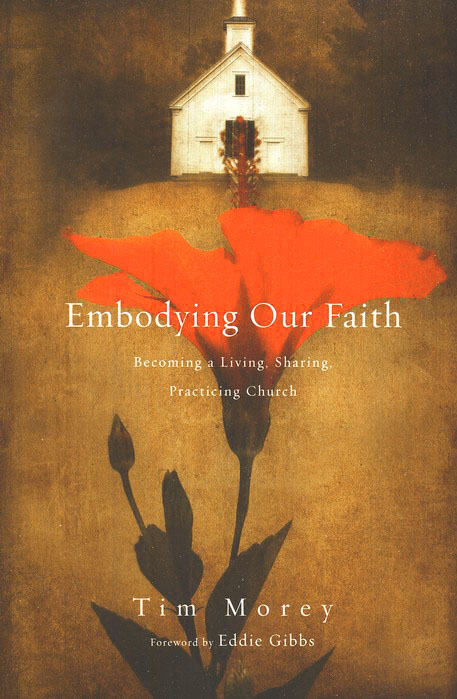We Are the Body: How to Become a Practicing Church

Editor's Note: The following is a report on the practical applications of Tim Morey's recent book, Embodying Our Faith: Becoming a Living, Sharing, Practicing Church, (IVP Books, 2009).
God wants your congregation to do much more than just come to church, focusing on more than just how they can benefit from what the church has to offer. His people are to be the church toward a world in desperate need of its message -- growing more like Jesus and doing their part to carry out His mission.
In our postmodern world, what lost people need is to see faith embodied in the lives of those who believe. That's how they'll best discover that the Gospel is true.
Here's how your church can learn to better embody faith:
Be a contributor instead of a consumer. Don't approach your faith with the goal of simply seeing how much you can personally gain from it; be willing to make the sacrifices Jesus calls you to make so you can contribute to the world through your faith. Don't reduce the church to just a vendor of religious services; view at as missionary community called to spread the Gospel's message in the world. Rather than thinking of church as just a place to enjoy music and uplifting messages while making friends, think of it from God's perspective - as a place to learn how to become more like Jesus and serve others in need to fulfill His purposes. Pray for the ability to shift your focus from inward to outward. Ask God to help you discover, develop, and use the talents He has given you to help make the world a better place. Be alert to the opportunities He places in your path, and be willing to respond to them.
Become a missionary to your culture. Study the culture that God has placed you in so you can learn how to communicate the Gospel message in the way that people in your time and place will best understand. Stay current on what messages the media (the Internet, movies, music, TV shows, etc.) is presenting, and think critically about how those messages reflect attitudes in your culture. Consider what questions people are asking about life and faith through the culture, and how you can point them toward biblical truth in ways they can relate to well. Remember to approach people as they actually are right now, not as you wish they were. Keep in mind that many people today aren't familiar with what the Bible says and don't view it as an authoritative source. You may need to help them notice how God is showing up in popular culture before encouraging them to read the Bible. When you do present the Gospel message, communicate it in a context suited for the time and place in which you minister to people.
Let people see a faith that's experiential. Ask yourself whether your church's worship services convey a sense of the transcendent reality of God. Give people plenty of opportunities to encounter God's power and beauty through worship practices like songs, prayers, Communion, teaching and proclaiming God's Word, art, and personal storytelling. When visitors witness God meeting people through sincere and passionate worship experiences, they can see the Gospel's truth in action. So show people what it looks like to praise God and invite Him to help you grow to become more like Jesus in the process.
Let people see a faith that's communal. Ask yourself if your church congregation manifests love for one another in such a way that it's an appealing community to people on the outside. People will more readily accept the Gospel's message when they see it embodied in a community of Christians - not just a lone individual. Commit to being shaped into Jesus' image through your relationships in your church community. Participate regularly in worship. Join a small group. Express your love for each other through kind and encouraging words and actions. Forgive each other when you each make mistakes, and reconcile your relationships. Serve the world together. Invite your non-Christian friends to serve alongside you so they can see God's love at work up close. Evangelize through personal relationships. Rather than just inviting people to events at your church, invite them fully into your life. Have them over to your home for meals, pursue common interests together (such as playing on the same sports team on the weekends), and talk about all aspects of your life so they'll see how God is at work throughout your life, not just when you go to church. When your non-Christian friends do come to visit your church, let them see how deeply you and those in your congregation are connected to one another because of how you participate in God's work together.
Let people see a faith that's enacted. Ask yourself if people can see God's purposes enacted in your life as you follow His call to go into the world and serve. Follow God's call into ministry projects of compassion and justice. That may mean volunteering at your local hospital or nursing home, collecting donations for your local food bank, building houses for the poor, delivering clothes and meals to homeless people, watching a single mom's kids so she can get a break, doing yard work for elderly neighbors, giving blood regularly or helping someone who needs a transplant - whatever God leads you to do. When you enact your faith through service, you show people what Jesus' love looks like in a tangible form. Rather than just saying prayers for people in need, be willing to be the answer to those prayers if God calls you to help. Then those who are watching will know that God is real because they'll see the reality of His love working through you.
Move beyond evangelism to discipleship. Don't stop at helping people find salvation. Encourage them to grow to become more like Jesus, as well. Help them mature in their faith. Introduce them to spiritual disciplines such as meditation, prayer, fasting, Bible study, simplicity, and solitude. Challenge them to consider how much more they're able to love God and other people every day through the ordinary decisions they make. Listen carefully to their thoughts and feelings. Be authentic and humble with them. Tell them stories of how God is working in your life and ask them to share what they notice about His work in their lives. Don't shy away from God's mystery and transcendence; capture their imaginations as well as their intellects. Encourage people to much more than just trust Jesus to get them to heaven. Invite them to participate in God's world-changing mission.

Tim Morey (D.Min., Fuller Theological Seminary) is founding and lead pastor at Life Covenant Church in Torrance, California. He also serves on the Evangelical Covenant Church's national church planting team and as adjunct professor teaching practical theology at Talbot School of Theology.
Original publication date: February 10, 2010
Originally published February 10, 2010.





